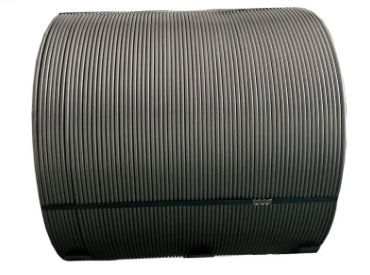
Cored wire injection is a versatile technique that has found widespread application in various industries, ranging from steelmaking to foundries and beyond. By utilizing a range of alloying elements encapsulated within a steel tube, cored wire injection offers precise and controlled delivery, resulting in improved product quality and process efficiency. In this article, we delve into six distinct applications of cored wire injection and the benefits they bring to different sectors.
In the realm of steelmaking, cored wire injection plays a pivotal role in alloying processes. Alloying cored wires containing elements like silicon, calcium, and aluminum are introduced into the molten metal bath, allowing for precise control over the composition of the steel. This technique enables the production of specialty steels with specific properties, such as enhanced corrosion resistance, strength, and heat resistance.
Furthermore, cored wire injection contributes to the cleanliness of steel through deoxidation and desulfurization. Cored wires with alloying elements like calcium and aluminum react with oxygen and sulfur impurities, reducing their presence in the molten metal. This leads to cleaner steel with reduced inclusion content, improved mechanical properties, and better overall quality.
Cored wire injection finds valuable application in foundries, particularly in the production of ductile iron. The controlled release of alloying elements, such as magnesium or rare earth metals, through cored wires facilitates the nodularization process. Nodularization improves the microstructure and mechanical properties of the iron, enhancing its strength, ductility, and wear resistance.
By precisely regulating the nodularization process with cored wire injection, foundries can consistently achieve the desired nodularity levels, ensuring the production of high-quality ductile iron castings with reliable performance.
Cored wire injection is extensively used in welding processes to modify the alloy composition of the weld metal. Alloying cored wires are introduced during the welding operation to add specific elements, such as chromium, nickel, or manganese, which can enhance the weld's strength, corrosion resistance, or other desired characteristics.
By employing cored wire injection, welders have greater control over the alloy composition, enabling them to tailor the weld metal's properties to meet the specific requirements of different applications, such as structural components or corrosion-resistant coatings.

In the aluminum industry, cored wire injection provides a precise and efficient method for introducing alloying elements into the molten aluminum. Cored wires containing elements like magnesium or silicon are used to achieve accurate alloy additions, ensuring the desired alloy composition and properties.
This application of cored wire injection in aluminum production allows manufacturers to optimize the alloying process, resulting in improved product quality, consistency, and efficiency.
Cored wire injection also finds application in foundry sand coating processes. Alloying cored wires, when injected into the coating, release elements that modify the properties of the coating material. This leads to enhanced casting surface finish, reduced defects, and improved mold release characteristics.
By incorporating cored wire injection in foundry sand coating operations, foundries can achieve higher-quality castings with improved surface aesthetics and enhanced process reliability.
In the production of ferroalloys, cored wire injection offers precise control over alloying additions. Ferroalloy cored wires, containing elements like calcium, silicon, or aluminum, are introduced into the molten metal bath to achieve accurate and consistent alloy compositions.
By utilizing cored wire injection in ferroalloy production, manufacturers can ensure the desired alloy properties, such as increased strength, heat resistance, or improved electrical conductivity. The controlled alloying process enabled by cored wire injection enhances the overall efficiency and quality of ferroalloy production.
Cored wire injection has proven to be a versatile and effective technique with diverse applications across various industries. From steelmaking to foundries, welding, aluminum production, foundry sand coating, and ferroalloy production, cored wire injection offers precise control over alloy additions, resulting in improved product quality, process efficiency, and enhanced properties.
By utilizing cored wire injection, industries can achieve consistent alloy compositions, enhanced cleanliness, precise nodularization, tailored weld properties, improved casting surfaces, and controlled alloying in ferroalloy production. These benefits contribute to the production of high-quality materials, increased operational efficiency, and overall cost savings.
As technology continues to advance, cored wire injection will likely find new applications and further enhance its role in various industries. The versatility and benefits of this technique make it a valuable tool for achieving desired material properties and meeting the evolving demands of modern manufacturing.

Write a Message